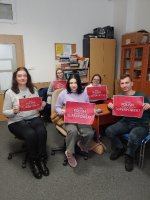
 Every year on 21st of February, Mother Tongue Day is celebrated around the world. This holiday was established by UNESCO in 1999.
Every year on 21st of February, Mother Tongue Day is celebrated around the world. This holiday was established by UNESCO in 1999.
The date serves as a remembrance of the events that took place on the 21st of February 1952 in Dhaka, Bangladesh, where police shot dead students demonstrating for the recognition of Bengali as an official language.
"The adjective 'maternal' ...does not refer to the collective, the state or its citizen, it refers to the person, his cognitive skills, success at school and the possibility to influence the future," explains doctor Júlia Choleva, from the Ľudovít Štúr Institute of Linguistics, Slovak Academy of Sciences.
Every year, Mother Language Day is held in many countries to promote and protect all languages (especially endangered languages), linguistic diversity and multilingualism. The Radio and Television of Slovakia has also focused on this day for several years. In its broadcasts, it addresses the issue of teaching the mother tongue, Slovak dialects and standard Slovak.
At Matej Bel University, according to tradition, students celebrate this day with their teachers. As a part of the events, they get acquainted with the linguistic features of Slavic languages, test their knowledge in language quizzes, or choose the most beautiful, the most important and the most difficult to pronounce words.
Data from the 2021 census shows that more than 26 languages are spoken in Slovakia. The most spoken mother tongue is Slovak, and others include Hungarian, Romani, but also Ruthenian, Czech, Russian, Ukrainian, German, Vietnamese, English, or Slovak Sign Language.
Let the 21st of February be a day for celebrating our national heritage, in which we can talk, express ourselves, think and learn every day.
Author and translator from Russian into Slovak Ľubica Skořepová


